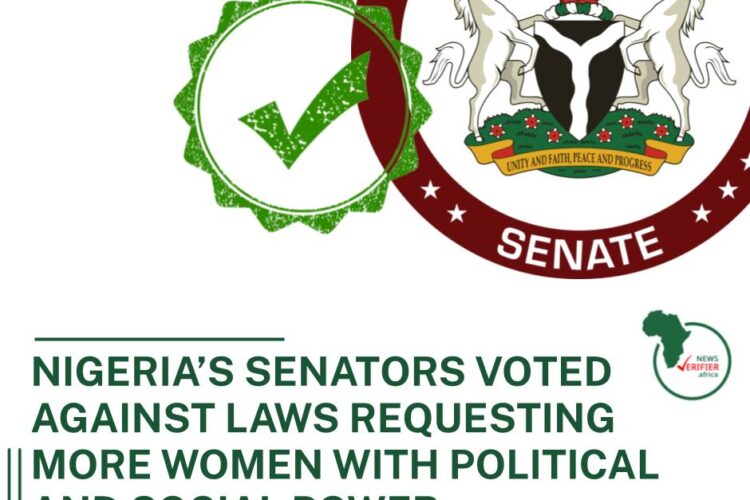
Adeyemi Okediran
On Wednesday, February 15, 2023, a Twitter user with a pseudo name “Nigerian Woman” (https://twitter.com/nnekacriss) said that Nigerian senators just voted against laws requesting more women with political and social power.
The user made this post while responding to another tweet. Her response reads in full, “Thanks for speaking facts. Nigerian senators just voted against laws requesting more women with political and social power. These girls do this money runs because that’s all they are told they need to do to live a good life. Also, men play into it. Men encourage this behaviour.)
POTENTIAL IMPACT OF THE CLAIM
The claim that Nigerian senators just voted against laws requesting more women with political and social power has the potential to impact the ongoing conversation around gender equality and women’s empowerment in Nigeria. Also, it could send a negative message to women and girls in Nigeria about their value and the importance of their participation in political and social life. At press time, the tweet had generated 3,556 views, 6 comments, 2 retweets, and 5 likes.
VERIFICATION
A web search revealed that the National Assembly recently voted against the two bills that sought to alter sections 48, 49, 71,77,91, and 117 of the 1999 Constitution as amended, by creating one additional senatorial seat and two federal constituencies in each state and FCT for women.
‘Bill for an Act to Alter the Provisions of the Constitution of the Federal Republic of Nigeria, 1999 to Provide for Special Seat for Women in the National and State Houses of Assembly; and for Related Matters’ would have created 111 extra seats for women at the National Assembly. On its part, the affirmative action bill provided for at least 35 percent position for women in political parties
Both bills got an abysmal number of votes during the clause-by-clause consideration during the constitution amendment at both chambers of the country’s legislature..During the voting process at the Senate, 30 senators voted for the creation of special seats and 58 voted against it. At the House of Representatives, 81 voted for the bill, while overwhelming 208 lawmakers voted against it. For affirmative action, 34 senators voted for and 53 voted against. The bills did not get the required number of votes to be passed.
CONCLUSION
The claim that Nigerian senators recently voted against laws requesting more women with political and social power is MOSTLY TRUE. While it is true that the Nigerian Senate rejected bills that sought to increase the participation of women in politics, it cannot be ascertained what constitutes social power. Nonetheless, the rejection of the bill has been widely viewed as a setback for gender equality in Nigeria.



